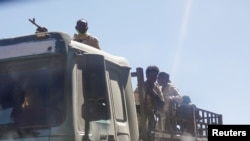Witnesses in the towns of Axum and Shire, in Ethiopia's Tigray region, say some Eritrean forces withdrew Friday. It is unclear when the Eritrean troops will completely withdraw to their borders.
The withdrawal may ease fears of the Tigray rebel group, which has accused the forces of killing civilians and blocking aid.
The presence of Eritrean forces is seen as an obstacle to the enforcement of the peace agreement signed in South Africa in November between Ethiopia's federal government and the Tigray People's Liberation Front.
Mulu Beyene is a Tigrayan living in Norway. This week, he connected with his mother and other relatives in the Tigray region after the restoration of telecommunication services. He said Eritrean forces need to leave the region.
"The fact that they began reportedly leaving some parts of Tigray is a welcome development; most importantly, it needs to be followed through all other towns and villages of Tigray, too," he said.
Beyene spoke to relatives in Adwa town Friday. He said Eritrean forces, militias and government forces are in charge of the town, where abuses against the population continue.
"There are many types of military people around the town. People largely don't know what has what mandate, because Eritrea seems to be in the vicinity of the town. Federal police are also holding some pockets of the town, and there are other military people from the Amhara region that come and go from time to time. Sometimes they arrest people and killings are reported from time to time," he said.
Ethiopian federal forces and Eritrean forces captured Adwa in October after the Tigray rebel group suffered losses and withdrew.
A week later, the warring factions met in South Africa and agreed to end hostilities, attend to the population's humanitarian needs, and restore services in the region.
This week, the groups agreed to form a joint monitoring team to oversee the cease-fire and follow up on the peace deal's implementation.
Tigray rebel group spokesman Getachew Reda said government forces were taking positions previously occupied by their troops.
"We have done every effort on our part to make sure that all the heavy weapons that we have at our disposal for the monitors to monitor," Reda said. "Of course, the battalion that is responsible has already moved into position and it clearly shows that, with a clear understanding between our two sides, that there is nothing that cannot be achieved."
Tigray regional leaders have expressed concerns about the presence of foreign forces and other militia groups.
Ahmed Mohamed, the head of the Center for Security and Strategic Studies, said the mistrust between the warring factions will be there for some time, despite making progress in stopping the war.
"The only obstacle I see so far maybe is in the area of trust between the parties and between individuals having followed what they have gone through so far in the last year or so, and the damages have been done so far. The idea of that trust is what will be very paramount, but I am sure with what we have seen so far, with the engagement so far with parties agreeing and conforming to the agreement, that mistrust will go," he said.
Mohamed said the federal government must deliver peace as Tigray accepts being under central government leadership.
"The biggest loser in the whole conflict is the Tigray people and the Tigray leaders and therefore, they were most affected," he said. "They were badly hit and because of that, it's fair that the federal government comes down, cools down, remains calm and delivers to their best of its ability to bring back normalcy in the Tigray region. In essence, the whole thing lies with the federal government."
The two-year conflict has killed hundreds of thousands of people and displaced millions. The peace agreement has brought some normalcy to Tigray families that can now reconnect as the region comes out of a long stretch of isolation from the rest of the country.




